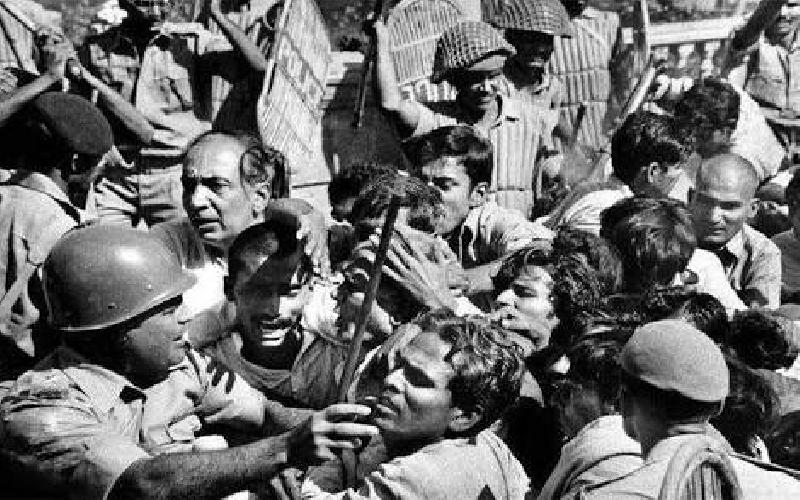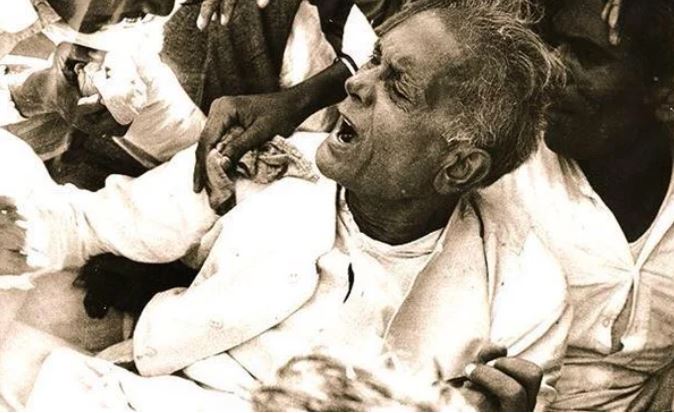The greater the power, the more dangerous the abuse.
Edmund Burke

India faced this problem every now and then, but never in the history of independent India have we faced such a constitutional crisis as during the 21 month period in 1975-1977, when a state of emergency was declared across the country on the grounds of internal disturbance. 25th June 1975, is remembered as one of the darkest days of the Indian Democracy. The emergency comes under article from 352 to 360, article 352 of the Indian constitution talks about the national emergency. The national emergency is imposed when there is a grave threat to the security of India or any of its territories due to war, external aggression or internal disturbance. Such emergency shall be imposed by the president on the basis of a written request by the council of ministers headed by the Prime Minister.
What did happen?

In 1971 Parliament elections, Indira Gandhi fought the election from Rae Bareli constituency and defeated Raj Narain. He filed a petition in the Allahabad High Court accusing Indira Gandhi of electoral malpractices, bribing voters and misuse of government machinery. Cross-examination was done by the High Court and this was done for the first time with Indian Prime Minister and Indira Gandhi was found guilty. On 12 June 1975, Justice J.M. Sinha declared her elections null and void as well as barred her from contesting any election for next six years. Even the leading party got a chance to replace P.M. in 20 days. This case reached the Supreme Court, on 24th June.
Court granted her the permission to be a member of parliament but was not allowed to take part in the Lok Sabha proceedings. In order to protect the Prime Ministerial seat, Indira Gandhi recommended the President to proclaim a state of emergency on the grounds of internal disturbance, and he did so immediately.
On June 25, 1975, Indira Gandhi announced on the All India Radio (AIR) about the imposition of Emergency by President Fakruddin Ali Ahmed. The words of Prime Minister Indira Gandhi were “The President has proclaimed Emergency. There is nothing to panic about.” Even the cabinet ministers were informed a few hours ago, it was all pre-planned. There was power cut for two days so that nothing could be printed and sent to the people and from the early morning of 26 June, hundreds of political leaders, activists, and trade unionists who opposed the Congress Party were imprisoned. Elections across the country were suspended and civil liberties were curbed.
Power was in the hands of the union government, all the fundamental rights were curtailed, this included the right of citizens to move to Court for restoring their fundamental rights. All newspapers needed to get prior approval for all their articles to be published. This is known as press censorship and apprehending social and communal disharmony.

The protests, led by students, played a pivotal role in forming a nationwide strong opinion against the then Congress Government and Indira Gandhi. In the year 1974, students in Gujarat started a staunch protest against increasing inflation and corruption in the state government. The protests spread like a wildfire and sought the support of major opposition parties and leaders like Jai Prakash Narain and Morarji Desai. The protests became so intense that it led to the imposition of President’s Rule in the state. Subsequently, elections were held in Gujarat, which the Congress had to face an embarrassing defeat.
Students in Bihar, too, started protesting against rising prices, food scarcity, corruption and unemployment. The protests gained momentum and Jai Prakash Narayan was invited to the students’ protest in Bihar, which led to the sensitisation of the protests on a national level. JP Narayan, not only demanded the dismissal of the Congress Government but also gave a call for a total revolution in various spheres of the nation.
Problems faced by the People
The goal of the 21-month-long Emergency in the country by Indira Gandhi was to control “internal disturbance” such as-
- Jayaprakash Narayan movement threatened India’s security and democracy.
- Need for development and upliftment of the economy.
- The threat of external powers.

These were the reasons given by Indira Gandhi for the National Emergency. All the protests, strikes and public agitations were also disallowed, nearly 1,11,000 people were arrested under preventive detention laws. Torture in police custody and custodial deaths also occurred during this emergency. But as the month passed, the situation of the country worsened and everything got messed up. Increase in unemployment, rampant, inflation and scarcity of food were the major problems in the economy. The social and economic conditions of the country were in bad shape during 1972-1975.During this time there was a general increase in prices of commodities (23% in 1973 and 30% in 1974).
Such a persistently high level of inflation was causing great distress to people. Moreover, industrial growth was low and unemployment was high. Sanjay Gandhi, the Prime Minister’s younger son, did not hold any official position at the time. But he was involved in many activities during emergency such as Jama Masjid beautification and slum demolition in which 150 died in firing as well as 70,000 were displaced and moved to a new undeveloped housing site across the Yamuna river. Secondly, there was a Compulsory sterilisation program to limit population growth. His roles in these activities became very controversial in Delhi.
Conclusion
At the end of the emergency, the demands for fresh elections became intense in the country. The newspapers like The Indian Express and The Statesman protested against censorship by leaving blank spaces where the news had been censored. Was the Emergency justified?
On 25 June 1975, where JP Narayan announced a nationwide Satyagraha for Indira Gandhi’s resignation and asked the army, police and government employees not to obey ‘illegal and immoral orders’. On 21 March 1977 the Emergency was withdrawn by Prime Minister Indira Gandhi and was decided to conduct fresh elections in March. All the leaders and activists were released from jails. Elections were conducted, the Congress party had to face a humiliating defeat in the Lok Sabha elections. The Congress could win only 154 seats in the Lok Sabha, whereas the Janta Party got 295 seats (330, along with its allies).
Indira Gandhi was defeated from Rae Bareli and her son Sanjay Gandhi from Amethi. The emergency was for personal interest, how much loss and destruction was suffered by the people of the country during those two years. Afterwards, there were several amendments done such as substituting ‘armed rebellion’ in place of ‘internal disturbance’ and making it necessary that the advice to the President to proclaim emergency must be given in writing by the Council of Ministers, as well as a judicial review, can be done anytime and even there is a need of special majority for the approval of emergency instead of a simple majority. Article 20 and 21 will not be suspended during an emergency as well as courts can issue right on the ground of Habeas Corpus. This is how a skippable emergency end.
Submitted by Deepti Ahlawat.